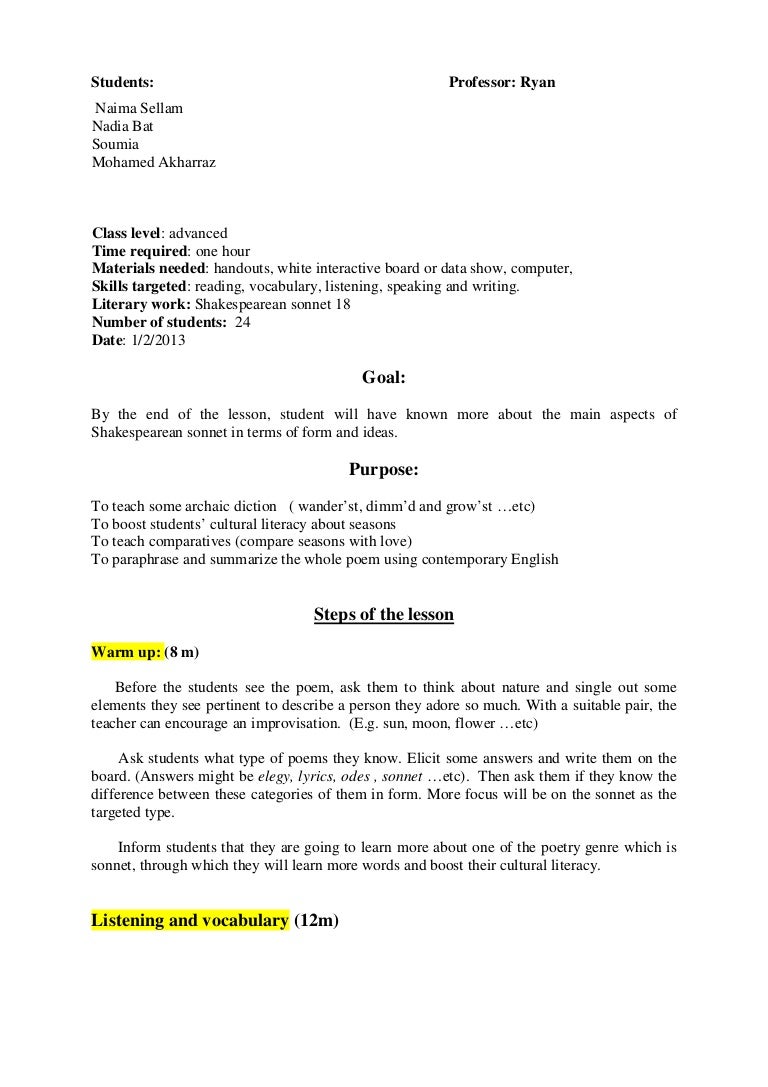

The poem opens with the famous complimentary question: It is notable that their physical features are not actually described – we are told nothing specific of how they look – instead Shakespeare compares his love to a summer’s day and concludes that their beauty is greater than that of summer and the sun. The sonnet begins with conveying the beauty of Shakespeare’s love. In this sonnet, Shakespeare also boasts to have the power to preserve his love’s beauty through poetry which has lead critics such as James Boyd-White to claim that it is actually ‘one long exercise in self-glorification’ rather than a love poem. It deals with the theme of beauty and the way it is affected by time. Like other sonnets, it is written in iambic pentameter form, consisting of four quatrains and a rhyming couplet.

Shakespeare gives the sun a "complexion", which usually refers to the skin one’s face.Sonnet 18 is among the most famous of Shakespeare’s works and is believed by many to be one of the greatest love poems of all time. He calls the sun the "eye of heaven" and refers to it using the word "his". These lines are saying that sometimes the sun is too hot, and other times you can’t even see it at all, hidden by clouds. Shakespeare also uses personification in lines five and six when he writes, “Sometime too hot the eye of heaven shines, And often is his gold complexion dimm’d ”(5-6). This means that whether is a metaphor to a rentable property. The word “lease”, used to describes the short summer, is the same word meaning a contract by which one party conveys land, property, services, etc., to another for a specified time. What he is saying is that the strong summer winds is a threat to the new flower buds that popped up in May, and summer won’t last very long and that it is fated to end. Both words are usually applied to human characteristics.

In these two lines, winds are able to “shake” things and buds are described as “darlings”. But near the end in his sestets, Sonnet 18 takes a …show more content… Shakespeare uses personification in lines three and four when he states, “Rough winds do shake the darling buds of May, And summer’s lease hath all too short a date:”(3-4). In contrast to his beloved in being mild/constant and beautiful, he continues in his octave to describe summer as season with that brings unpleasant extremes of windiness and heat. In Sonnet 18’s octave, he starts off with a question and a quick statement of his beloved “Shall I compare thee to a summer’s day? Thou art more lovely and more temperate:”(1-2). It is as if Shakespeare is describing his beloved as a perfect being. The sonnet starts off by praising a beloved’s beauty and, as we slowly progress through the rest of the sonnet, transform this beloved’s beauty into something almost immortal.

Show More Sonnet 18, written by William Shakespeare, is the most popular amongst his other 154 sonnets.


 0 kommentar(er)
0 kommentar(er)
